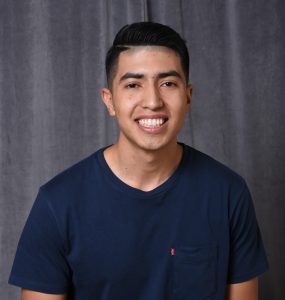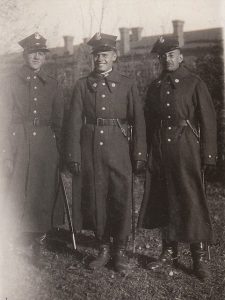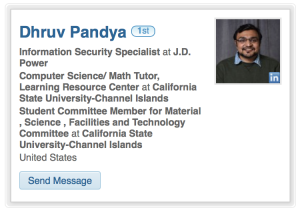 Eric Valenzuela graduated with a degree in Computer Science in 2016. He is now a web developer at Yardi. During his years at CI, Eric was a Software Engineering interns at Sandia National Laboratories. Before his current position at Yardi, he was a Software Engineer at CTL SystemWare.
Eric Valenzuela graduated with a degree in Computer Science in 2016. He is now a web developer at Yardi. During his years at CI, Eric was a Software Engineering interns at Sandia National Laboratories. Before his current position at Yardi, he was a Software Engineer at CTL SystemWare.
Blog
Understanding Cybersecurity & Privacy Best Practices

Source: (18) Understanding Cybersecurity & Privacy Best Practices | LinkedIn
Position at Ventura College
Ventura College is currently in search for a CS faculty member. Initially to begin as an adjunct and then an opportunity to apply for tenure faculty. This is a good opportunity for our MSCS students. The contact is Lynn Wright at Ventura Collge. 805-289-6232.
Decade of research shows little improvement in password guidance
Leading internet brands including Amazon and Wikipedia are failing to support users with advice on how to securely protect their data, a study shows.More than a decade after first examining the issue, research by the University of Plymouth has shown most of the top ten English-speaking websites offer little or no advice guidance on creating passwords that are less likely to be hacked.Some still allow people to use the word ‘password’, while others will allow single-character passwords and basic words including a person’s surname or a repeat of their user identity.
Source: Decade of research shows little improvement in password guidance – University of Plymouth
One of our masters students now working at GBL as a Software Engineer
Eric Gentry recently joined GBL Systems, a government contract company working with the Navy at Point Mugu Naval Base. GBL Systems (https://www.gblsys.com) is based in Camarillo and works with CSUCI to hire top performing Computer Science graduates. Eric leads a team of software developers in creating military grade RADAR system tools as the Senior Software Architect and Team Lead.
You can see more about Eric Gentry in this post.
Congratulations Dhruv Pandya
Congratulations Dhruv Pandya, an alum of the MSCS program at CI, for a new position as an Information Security Specialist at J.D. Power.
Our graduates getting great jobs!
I graduated May 19th 2018, interviewed the 22nd, and I accepted a job offer on the 25th at @pivotal. So far the #computerscience program @csuci seems to have prepared me to contribute to a #softwareEngineering team “transforming how the world writes software.” #ThankYou https://t.co/MmFnKs3c7h
— Christopher Hunter (@crhntr) July 10, 2018
PhD fellowships in Computer Science at the University of Pisa
14 PhD fellowships in Computer Science at the University of Pisa, covering three years: Nov 2018 – Oct 2021
This PhD program is a joint collaboration between the University of Pisa and the Universities of Florence and Sienna. Among the 14 fellowships: one is specifically reserved to students which got their master degree outside Italy, one fellowship is devoted to researches on Cyber-security, one on the theme Big Data, and one onthe theme “Human-Robot Interaction”. The others cover the general theme “Computer Science”. We also have 4 more positions without fellowships.
Fellowships are increased by 50% for periods of research visits abroad. Extra funding is available for participation to international conferences, schools, workshops, and short research visits. The language of the PhD program is English.
The deadline for applications is 25 July 2018 (hr 13:00).
For more info on the call please look at the site:
EN: http://dottorato.unipi.it/index.php/en/application-process-for-the-academic-year-2018-2019.html
IT: http://dottorato.unipi.it/index.php/it/concorsi-d-ammissione-a-a-2018-2019.html
Continue reading “PhD fellowships in Computer Science at the University of Pisa”
Katyń, Smolensk and my grandfather
 My grandfather Antoni Zbigniew Soltys-Kulinicz, middle, was an officer in the Polish army during World War II. He was imprisoned in a POW camps, and at the end of the war took the first deposition of the Katyń massacre, and thus helped to shed light on this Soviet atrocity against poles. He found himself in London after the war, but decided to return to his home country, now under Soviet occupation, and he lived there knowing that his connection to Katyń (a massacre that was hypocritically denied by the Soviets and the puppet regime in Poland) could cost him his freedom or his life. Especially, as he was mentioned in history books for his role in translating into English the depositions given to him by witnesses.
My grandfather Antoni Zbigniew Soltys-Kulinicz, middle, was an officer in the Polish army during World War II. He was imprisoned in a POW camps, and at the end of the war took the first deposition of the Katyń massacre, and thus helped to shed light on this Soviet atrocity against poles. He found himself in London after the war, but decided to return to his home country, now under Soviet occupation, and he lived there knowing that his connection to Katyń (a massacre that was hypocritically denied by the Soviets and the puppet regime in Poland) could cost him his freedom or his life. Especially, as he was mentioned in history books for his role in translating into English the depositions given to him by witnesses.
I plan to write a longer post about this fascinating history, but for now I will note that sadly history repeats itself, as new evidence is coming to light that the crash of the Polish airplane (April 10, 2010), carrying the entire head of the Polish government to Smolensk to commemorate the 50th anniversary of Katyń, took place with Russian involvement. Among the dead were President Lech Kaczyński and his wife, much of the president’s staff, 18 parliamentarians, 10 generals and admirals representing Poland’s top military leadership, and many other political notables. The disaster decapitated Warsaw. Read more here.
